#jesse reeves
Text

Jesse Reeves
My version of this wonderful female Vampire - I guess she‘s a strong person with an high IQ…Maybe she helps the older members of court understand the modern times…
#artwork#vampire chronicles#iwtw#art#artists on tumblr#vampire community#anne rice#jesse reeves#qotd#vampire
31 notes
·
View notes
Text

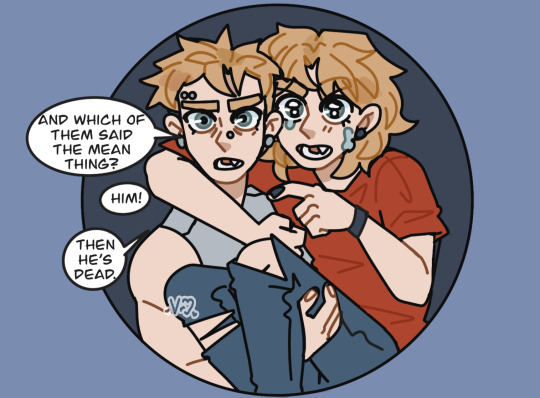

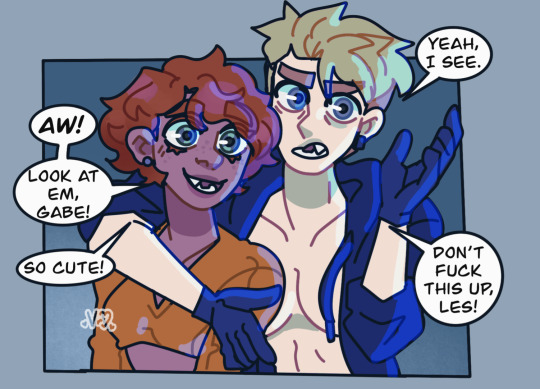
#gabrielle de lioncourt#lestat de lioncourt#louis de pointe du lac#jesse reeves#iwtv#iwtv fanart#amc interview with the vampire#interview with the vampire#verymerrymart
566 notes
·
View notes
Text


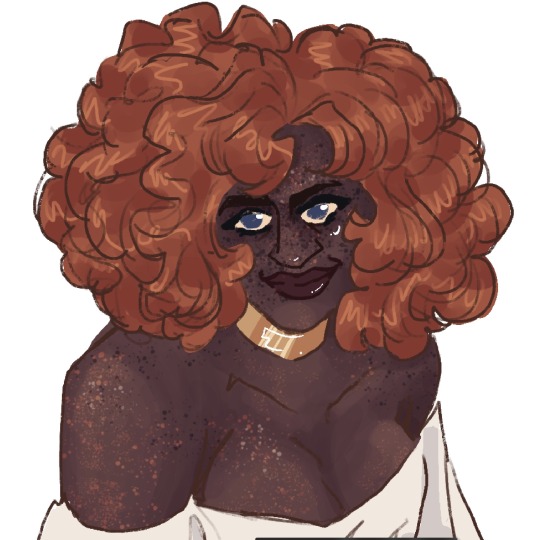

Queens of the Damned and Jesse!
#annual ‘I miss them’ post#Mekare marry me- WHO SAID THAT-#hashtag heterochromia#hashtag a very grOoVy mutation#art#fanart#digital art#fan art#my art#iwtv#tvc#tvc fanart#tqotd#the queen of the damned#jesse reeves#maharet#Mekare
134 notes
·
View notes
Text
Just for fun
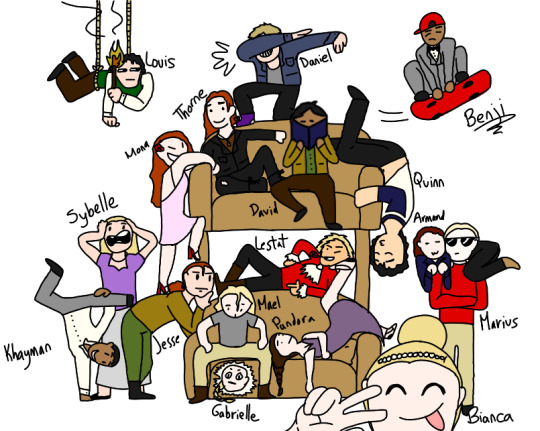
#vc#lestat de lioncourt#louis de pointe du lac#daniel molloy#benji mahmoud#thorne#david talbot#mona mayfair#sybelle#khayman#jesse reeves#mael#gabrielle de lioncoirt#pandora#armand#quinn blackwood#marius de romanus#bianca solderini
167 notes
·
View notes
Text

MicroFic May - A Vampire Chronicles Fandom Event
What:
Four prompts will be given each week, for all four weeks in May, starting on Sunday, May 4. The goal is to use one or more of those prompts to create short fiction for that week: drabbles, ficlets, vignettes, and short works aiming to be between 100 to 1000 words. (Though no one is going to be mad if you go a little over.)
You can post your work on Tumblr, AO3, anywhere you post fic. Please tag @vcmicroficmay and use the hashtag #vcmicroficmay to help us find your work so we can share it, and feel free to message us if you think we missed your entry!
Why:
Short fiction is great! It’s challenging to keep things short but that’s part of the fun. A limited number of words can really draw things into focus and can highlight things that might otherwise get lost. It allows writers to explore new ideas or ideas that one would not necessarily write a longer story about. It offers the chance to explore little moments and slices of life without the pressure of turning it into a longer work.
Rules:
Entries should aim to be between 100 words to 1000 words, though no one is going to be counting and it’s fine to go a little over (or under!)
Works can be inspired by The Vampire Chronicles books, the IwtV movie, the AMC show, the musical, whatever.
Late entries are great!! Creativity doesn’t work on a schedule. We appreciate your fic no matter when it appears.
You can post your work on Tumblr, AO3, or wherever you post fic and link to it from Tumblr. We will have a collection on AO3 you will be able to add your work to as well.
Please consider sharing and commenting on other people’s entries as that’s part of the fun!
When:
We’ll post the prompts at the beginning of April to help everyone prepare and then we’ll repost the prompts for the week on every Sunday in May, starting on May 4, as a reminder.
For now, please share, spread the word, and let us know if you have questions!
#the vampire chronicles#tvc#vampire chronicles#lestat de lioncourt#louis de pointe du lac#daniel molloy#armand#marius de romanus#bianca solderini#pandora#jesse reeves#vc fandom#fandom event#vcmicroficmay#vc#amc iwtv#iwtv 2022#interview with the vampire#the vampire lestat#queen of the damned
57 notes
·
View notes
Text
Requested by @fofoqueirah! Jesse, David and Lestat swapping contact details on their phones (i.e. Lestat VS his iPhone)
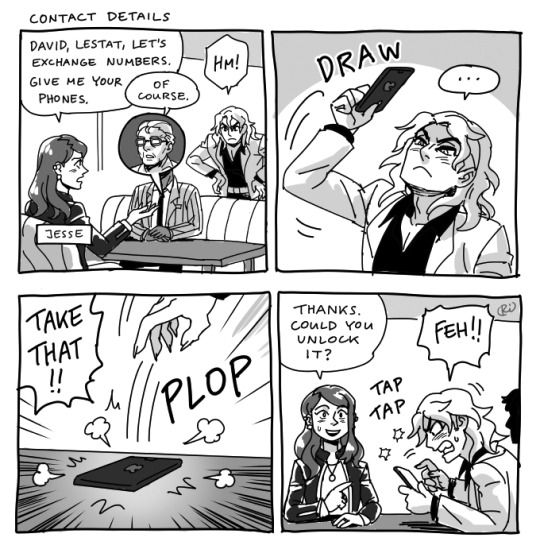

(From Prince Lestat)
#the vampire chronicles#prince lestat#lestat de lioncourt#jesse reeves#david talbot#illustrated shitpost#requests
175 notes
·
View notes
Text
The paralells between Jesse and Daniel losing their connections to family as they pursue the supernatural in Queen of the Damned is really interesting.
It's ironic because Jesse is literally related to vampires and has spent time with them and noticed little oddities, though she does not realize what they are. But she becomes so engrossed in her confidential work at the Talamasca that visits with family become a holidays-or-when-they're-in-London thing, and she stops writing letters because she can't talk about what she's working on (it's Top Secret.)
Meanwhile, Daniel pursues vampires and finds Armand, who then pursues him, and gets so caught up in running around the world that he probably doesn't do much more than send the odd postcard home, maybe make the occasional phone call on holidays. We don't actually know how much contact he has with family during that time but I personally suspect it was not a lot. And once he and Armand get together, he's spending his nights being dragged all over the place, and his days sleeping it off. There's not exactly a lot of time to write long letters or make phone calls at normal waking hours.
We do know by the Night Island Era (1982? 1983?) he hasn't really had any contact with anyone from his previous life for a while:
"It had been years since Daniel had even thought of his family, of the friends he used to know. Checks went out to kin, of that he'd made certain, but they were just names now on a list."
Anyhow, it's just interesting that both Jesse and Daniel get so caught up in the pursuit of the supernatural that their mundane, mortal lives fall away and they lose those connections. Then both of them end up becoming vampires. Jesse, of course, gets to reconnect with her family and her "aunt" Maharet. Whether Daniel ever has contact with anyone in his family afterward is unknown but dubious and unlikely.
I guess the point is that you cannot pursue the supernatural and continue to live a normal life. Which is something we see play out in the series again and again.
#jesse reeves#daniel molloy#vc meta#also lol forever at maharet's reaction to jesse joining the talamasca#'they cannot do anything important i hope you tire of them'#she is amazing#maharet#queen of the damned#vc#vampire chronicles#vc quotes#tvc#the vampire chronicles#i also don't think daniel was super close to his family before all of this happened either#which didn't help the situation#but it is interesting to think about
73 notes
·
View notes
Text

Red hair time! These are my take on the characters from the third book of Vampire Chronicles, The Queen of the Dammed. Sometimes a girl only wants to do a 3/4 portrait and call it a day.
DISCLAIMER: Maharet's appereance is based on middle eastern bedouins, since she was from the mount Carmel originally and before any abrahamic religion. I wanted to despict her in the most accurately way possible and with all due respect. If you want to know more about the tattoos, i would recommend checking their art
i took this north palestinian woman as a reference as well
#vampire chronicles#the vampire armand#armand#iwtv#maharet#jesse#interviewwiththevampire#interview with the vampire#my stuff#jesse reeves
84 notes
·
View notes
Text

congratulations to jesse!!!!!! first person to fall in love with a guy in california who actually did turn out to be a druid and not just some sleazy drifter!!
i mean he is a sleazy drifter, just not only a sleazy drifter. the druid stuff is true as well.
49 notes
·
View notes
Text
The Trial of Armand
Armand’s degree of responsibility for Claudia’s death is…disputed. Not just among fandom, but in the books, no one quite agrees on how to characterize him during that time, and there are three different accounts of those events in Paris. We get a different Armand in Louis’, Lestat’s, and finally in his own recollection.
We know, because Armand admits it, that Armand killed Claudia in the literal sense—he was the one to take her to the courtyard with his own hands. But that doesn’t mean he condemned her. If he didn’t carry out the sentence, someone else would have.
So was Armand actually primarily to blame for her death? Did he even go so far as to engineer her death himself?
Louis is the only one who directly blames Armand for Claudia’s death, but it’s important to take a look at why he does so.
“I could not prevent it,” Armand said softly to me. And I looked up to see his face unutterably sad. He looked away from me as if he felt it was futile to try to convince me of this, and I could feel his overwhelming sadness, his near defeat. I had the feeling that if I were to vent all my anger on him he would do little to resist me. And I could feel that detachment, the passivity in him as something pervasive which was at the root of what he insisted to me again. “I could not have prevented it.”
“Oh, but you could have prevented it!” I said softly. “You know full well that you could have. You were the leader! You were the only one who knew the limits on your own power. They didn’t know. They didn’t understand. Your understanding surpassed theirs.”
He looked away still. But I could see the effect of my words on him. I could see the weariness in his face, the dull lusterless sadness of his eyes.
“You held sway over them. They feared you!” I went on. “You could have stopped them if you’d been willing to use that power even beyond your own self-prescribed limits. It was your sense of yourself you would not violate. Your own precious conception of truth!”
Later, when they’re breaking up, they have this exchange:
“You could have told me anything you wanted about Paris, Armand,” I said. “Long before now. It wouldn’t have mattered.”
“Even that it was I who…?”
I turned to him as he lay there looking at the sky. And I saw the extraordinary pain in his face, in his eyes. It seemed his eyes were huge, too huge, and the white face that framed them too gaunt.
“That it was you who killed her? Who forced her out into that yard and locked her there?” I asked. I smiled. “Don’t tell me you have been feeling pain for it all these years, not you.”
And then he closed his eyes and turned his face away, his hand resting on his chest as if I’d struck him an awful, sudden blow.
Louis does blame Armand for Claudia’s death in two senses: first, he believes that Armand could have stopped Santiago and the others from carrying out Claudia’s execution, and second, Armand literally killed Claudia. With the former, this isn’t necessarily a rational blame, nor does it have to be—Louis is grieving. It’s understandable that he thinks Armand could have done more to save Claudia. Perhaps he’s right. It’s also understandable that he can’t get past Armand being the one to carry out the sentence, regardless of whether it was Armand’s will for her to die.
Lestat is much less kind in his own account, but that’s because Armand is very cruel to him, and Lestat is seriously just relaying facts. Armand doesn’t do any disputing of how Lestat recounts his treatment. And it’s bad. But also, Lestat’s is the most disjointed and confused account of these events, and it does the least amount of interpreting. He arrives in Paris, still badly wounded from being attacked, and asks for Armand’s powerful blood so he can heal.
I repeated some foolish phrases about Louis’ indestructible humanity, his understanding of things that other immortals couldn’t grasp. Carelessly I whispered things from the heart. It wasn’t Louis who had attacked me. It was the woman, Claudia…
I saw something in him quicken. A faint blush came to his cheeks.
“They have been seen here in Paris,” he said softly. “And she is no woman, this creature. She is a vampire child.”
I can’t remember what followed. Maybe I tried to explain the blunder. Maybe I admitted there was no accounting for what I’d done. Maybe I brought us round again to the purpose of my visit, to what I needed, what I must have. I remember being utterly humiliated as he led me out of the house and into the waiting carriage, as he told me that I must go with him to the Theater of the Vampires.
“You don’t understand,” I said. “I can’t go there. I will not be seen like this by the others. You must stop this carriage. You must do as I ask.”
“No, you have it backwards,” he said in the tenderest voice.
Lestat recalls from here how he was locked in a cell and allowed to starve, neglected.
And then Armand was there, standing motionless in the shadows, immaculate in his white linen and black wool. He spoke in an undertone about Louis and Claudia, that there would be some kind of trial. Down on his knees he came to sit beside me, forgetting for a moment to be human, the boy gentleman sitting in this filthy damp place. “You will declare it before the others, that she did it,” he said. And the others, the new ones, came to the door to look at me one by one.
“Get clothing for him,” Armand said. His hand was resting on my shoulder. “He must look presentable, our lost lord,” he told them. “That was always his way.”
The trial itself.
It was a mob tribunal of monsters, white-faced demons shouting accusations, Louis pleading desperately, Claudia staring at me mute, and my saying, yes, she was the one who did it, yes, and then cursing Armand as he shoved me back into the shadows, his innocent face radiant as ever.
“But you have done well, Lestat. You have done well.”
Armand takes Lestat to Magnus’ tower, gives him Claudia’s yellow dress, and tells him Louis is dead. Lestat confronts him.
“Why can’t you stop them? Why did you do it, the trial, all of it, what do you care what they did to me?”
“It’s finished.”
From this account, we’re definitely left with the impression Lestat, at least, seems to think the trial was Armand’s doing, though he has been given no information, left to extrapolate from almost nothing. Between his desire for Louis and his resentment toward Lestat, Armand definitely had motive. He had Lestat as a captive, both means and opportunity. But does Lestat ever state definitively that Armand was the mastermind behind Claudia’s demise? Did those motivations and means actually add up to Armand being the chessmaster? Lestat isn’t clear.
“It wasn’t that I wanted vengeance,” he whispered. His face was stricken, his heart broken. He said, “But you came to be healed, and you did not want me! A century I had waited, and you did not want me!”
What Armand says here suggests something about his actions was deliberately malicious toward Lestat, that he was lashing out because he was in pain, but he doesn’t mention any specific deed. He did a lot to Lestat in Paris. He also doesn’t mention Louis here. But this, as well as circumstances, is our best evidence so far, one way or another, whether Armand engineered Claudia’s death.
What if you haven’t wallowed in The Vampire Lestat’s florid descriptions of me and my alleged delusions and errors?
It’s worth stating that by the time he recounts his own story, Armand has come to see these events much more reasonably, and no longer blames Lestat for the dissolution of his old coven (except when he’s angry and needs something to throw in his face). He doesn’t paint Lestat as a villain or himself as a victim in their history together. He also doesn’t dispute either of the other two accounts, apart from one detail (whether he could have prevented Claudia’s death), but his account is only the second time any of the three accounts even mentions the idea that he deliberately engineered Claudia’s death. The other time is Lestat’s very understandable assumption that Armand, not Santiago, was behind the trial.
Who among us is going to let me be silent on the matter of Claudia, the child vampire whom I am accused for all time by all of having destroyed?
And what does he have to say about it?
For the record, she was slain by my Coven of mad demon actors and actresses, for, when she surfaced at the Théatre des Vampires with Louis as her mournful, guilt-ridden protector and lover, it became all too clear to too many that she had tried to murder her principal Maker, The Vampire Lestat. It was a crime punishable by death, the murdering of one’s creator or attempt at it, but she herself stood among the condemned the moment she became known to the Paris Coven, for she was a forbidden thing, a child immortal, too small, too fragile for all her charm and cunning to survive on her own. Ah, poor blasphemous and beauteous creature. Her soft monotone voice, issuing from diminutive and ever kissable lips, will haunt me forever.
But I did not bring about her execution. She died more horribly than anyone has ever imagined, and I have not the strength now to tell the tale. Let me say only that before she was shoved out into a brick-lined air well to await the death sentence of the god Phoebus, I tried to grant her fondest wish, that she should have the body of a woman, a fit shape for the tragic confusion of her soul.
He then confesses that he decapitated her and tried to sew her head onto a woman’s body, only to fail, attempt to reattach her head to her own body, and pretty well fail at that as well. He admits all of this with great shame, and doesn’t in any way suggest he was doing it out of pity for her.
It was a truth I vowed to conceal forever from Louis de Pointe du Lac and all who ever questioned me. Better let them think that I had condemned her without trying to effect her escape, both from the vampires of the theatre and from the wretched dilemma of her small, enticing, flat-chested and silken-skinned angelic form.
All of this explains why he acts so guilty around Louis in Louis’ recollection, and why he doesn’t defend himself when accused of her death. But according to himself, he couldn’t have stopped his coven. This may or may not be true, but the important thing is that Armand perceived it so. He is telling us that Claudia’s death was not his aim. Even Louis doesn’t accuse him of engineering her death, merely of failing to have the courage to stop it. Lestat makes no guesses at Armand’s motivations or intentions, only records what he remembers him saying and what he remembers himself saying.
But why should we believe Armand? All people, even vampires, are subject to self-serving bias. Doesn’t Armand have the motivation to soften how people view him, and how he views himself?
Yes. He does. But in the same chapter as he claims he did not condemn Claudia himself, he admits something far more gruesome than anyone ever suspected him of. He does not soften how anyone views him. He also doesn’t blame others for his mistakes. He doesn’t lie in his account, that I can tell. You could argue he was lying to himself, trying to negotiate with his conscience over what to feel guilty for, but I’m not sure where the evidence is for that.
Why else might he deny the allegations?
Well, what allegations? Because the only person who so much as suggests that he actively instigated the trial in these accounts is Lestat, who does so in dialogue, and it’s never confirmed. Not through mind-reading or even passively, in the narrative. There’s no passing mention of it being a thing. It’s just Lestat asking why Armand made him testify, listing “the trial” among things he “did.” Which is simply an assumption. Lestat makes a lot of assumptions he later second-guesses, and it doesn’t help that Armand is the poster child for a disorganized attachment style.
What evidence is there in other books, then, for or against?
In Memnoch, Lestat observes (with a bit of self-gaslighting):
There was no envy in him, or old grudge against me; there was no hurt, or trickery, or anything. He was past all these things, if ever they had obsessed him. Perhaps they’d been fantasies of mine.
It is, in fact, possible for Lestat to be wrong. He’s a Creator’s Pet, not a Mary Sue, and at the time of the trial, he was barely able to make a coherent recollection. With everything he went through, as well as all the circumstantial evidence, I don’t know why he wouldn’t make the assumptions he did. But they weren’t assumptions he seemed to cling to long-term. By the time of Prince Lestat, he understands that Armand is someone who is just barely figuring out how to be a person, not the truly sinister villain he saw him as in TVL.
But let me add here that Armand isn’t the moral cipher I once thought he was. So much of what I thought about us, our minds, our souls, our moral evolution or devolution, was just wrong in the books I wrote. Armand’s not without compassion, not without a heart. In many respects, he’s just coming into himself after five hundred years. What do I know about being immortal? I’ve been in the Blood since when, 1780? That’s not very long. Not very long at all.
But also in Prince Lestat, he says this cryptic thing:
Ah, but I couldn’t blame Louis for shunning Paris. He’d lost his beloved Claudia — our beloved Claudia — in Paris. How could he be expected ever to forget that? And he’d known Armand was a jungle wildcat among revenants, hadn’t he?
This is pretty vague, and could be referring to Armand’s general wild card status, the fact that Armand did not have Louis’ back where Claudia was concerned, but it could also suggest he believes Armand was the mastermind behind the trial. The language used is highly suggestive of Lestat’s forgiving nature, indicating that this betrayal (since it’s arguable there was a betrayal either way) was simply part of Armand’s poorly-socialized nature. However, it’s ill-advised to take Lestat’s clemency at face value. He forgave Rhoshamandes and Kapetria, even claimed the latter was heroic for making sure not to kill him while giving him non-consensual brain surgery. It would not be out of character for him to claim Armand was more innocent than he was.
There is exactly one place I could find where anyone in the books straight-out claimed Armand intended Claudia’s death, and it’s in Queen of the Damned, as Jesse vaguely recalls the events of IWTV from when she read it:
Claudia had died in the Theater of the Vampires. The coven, under Armand’s command, had destroyed her.
The thing is, I’m not sure what makes Jesse an authority here. Jesse hasn’t even met any of these people at this point, and she certainly wasn’t there. She’s extrapolating from the circumstantial evidence while giving no reason to doubt Armand’s word. TVA was written well after QOTD, and as Lois McMaster Bujold says, “The author reserves the right to have a better idea.” It’s possible Anne thought for a time that Armand engineered Claudia’s death, then changed her mind, and Jesse isn’t exactly a definitive enough source to dispute the people who were actually there.
Armand warned Louis that Santiago was waiting for an excuse to take him and Claudia down. Taking everything as true from all three accounts, I would suggest Armand took Lestat captive not as a weapon against Claudia, but as a defense for Louis, because he knew Santiago would eventually come for Louis. Lestat did emphasize more than once to Armand that Claudia, not Louis, tried to kill him, and that was what Armand insisted he say at the trial.
There’s one problem, though, with the theory of Armand’s innocence: why didn’t Santiago make a move earlier? Why did the ambush happen hours after Louis asked Armand to give him just a little more time before leaving Claudia?
Armand does give this warning at that meeting:
“But…I think that as soon as possible they should leave Paris.”
“Why?”
“You know why. Because Santiago and the other vampires watch them with suspicion.”
It seems at once odd that Armand would give this warning if he was so close to bringing out the nuclear option (Lestat), and odd that the ambush happened when it did if he wasn’t involved. What new piece of evidence came about that allowed Santiago to pounce, if he was the instigator? Did he just get tired of waiting? Did he finally get enough coven members on his side? But why would Armand push for Claudia’s escape if he wasn’t going to give her time to do so, and risk having to chase her down?
But this is all circumstance and speculation. As far as the evidence—eyewitness testimony—goes, there isn’t enough to actually conclude that Armand meant Claudia harm, just that he didn’t care enough to save her.
The entire purpose behind the books that are character biographies (TVL, TVA, Blood and Gold, IWTV to an extent) is that they are tell-alls, context for everything else the character does in the series. Armand bringing up being accused of Claudia’s death rings of something Anne does sometimes: she addresses what her readers say. She once even had Lestat bitch hilariously about the response to Memnoch. Armand is addressing his reputation, not actual, in-universe accusations by named characters. Anne making a big claim to dispute a common fan assumption doesn’t make sense if the claim wasn’t meant to be true.
Regardless of Armand’s intentions with Claudia, could he have stopped the execution? That’s still debatable. He says in IWTV that he wanted minimal power as coven leader because having great power meant having to defend said great power. I think it also says a lot that he was a tyrant in his coven prior, as does his admission of his own misery during his days as a Child of Satan (Child of Darkness in pre-Prince Lestat books; who knows why she changed it). Lestat describes him as “autocratic,” but that was in the context of his time with the CoS. Yet here, he was actively trying not to intervene in his coven’s actions. Armand, in addition to some genuine apathy, was actually making some changes.
He didn’t want to repeat his previous mistakes, so he wound up making brand new ones.
Which is just what Armand does.
Isn’t it what we all do?
Well, hopefully less explosively.
#armand#the vampire armand#the vampire chronicles#tvc#lestat de lioncourt#louis de pointe du lac#interview with the vampire#the vampire lestat#queen of the damned#qotd#memnoch the devil#prince lestat#jesse reeves#claudia de pointe du lac#claudia de lioncourt#your honor he's the worst but have you considered he didn't do every single thing
23 notes
·
View notes
Text
#vc#polls#poll#lestat de lioncourt#armand#marius de romanus#daniel molloy#louis de pointe du lac#jesse reeves#mael#david talbot#pandora#khayman#gabrielle de lioncourt
219 notes
·
View notes
Text

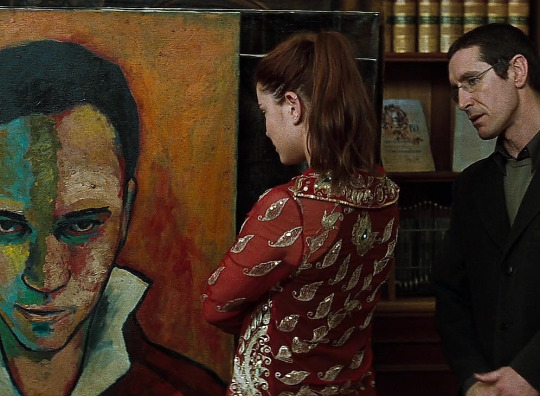
48 notes
·
View notes
Text
I've talked before about the similarities between Jesse and Daniel disconnecting from family as they pursue the supernatural, but there are so many other similarities between them and their experiences with vampires.
For example, they both have this moment of realization when looking at a vampire of how inhuman and strange the thing is (and yet they are both very attracted to said creature).
Daniel's realization gets passed around a lot because he compares Armand to an insect:
Daniel stared hard at the creature before him, this thing that looked human and sounded human but was not. There was a horrid shift in his consciousness; he saw this being like a great insect, a monstrous evil predator who had devoured a million human lives. And yet he loved this thing. He loved its smooth white skin, its great dark brown eyes. He loved it not because it looked like a gentle, thoughtful young man, but because it was ghastly and awful and loathsome, and beautiful all at the same time. He loved it the way people love evil, because it thrills them to the core of their souls.
This is right after Armand has come to him in Pompeii and he realizes they've been lovers for a while and Armand isn't going to kill him. He has a moment where the facade drops and he sees Armand for everything he is. (Spoiler, he still wants to hit it.)
Jesse has a similar realization about Mael, whom she does not yet know is a vampire:
Then, an odd realization had seized her. This isn't a human being. This is something pretending to be a human being. It was so clear. But it was also ridiculous! If it wasn't a human being, what the hell was it? It certainly was no ghost or spirit. That was obvious.
This is during a conversation with Mael where they're discussing ghosts and spirits, and Jesse is quite drunk and finds Mael very handsome and attractive. Yet she suddenly realizes that he's not human and has a moment of what the heck?
It's interesting to note that by this point, both Daniel and Jesse have a lot of experience with the supernatural. Daniel has met Louis, of course, and now has spent four years being chase around by Armand, whom he knows is a vampire. Jesse has seen ghosts (both of people and buildings, which is so fascinating!) all her life and is spending the summer in a house with vampires, though she does not know that is what they are.
It's a fascinating example of what mortals see when they really, truly see a vampire. Most mortals simply ignore the strangeness of their movements, the mesmerizing nature of their eyes, the demonic nature they hold. They shrug it off as imagined or a mistake, or the vampire uses mind tricks to convince them it's nothing. But then a mortal really sees a vampire, they absolutely see how utterly inhuman they are.
#daniel molloy#jesse reeves#queen of the damned#armand/daniel#jesse/mael#vc meta#vc#vampire chronicles#tvc#the vampire chronicles#vc quotes#qotd
42 notes
·
View notes
